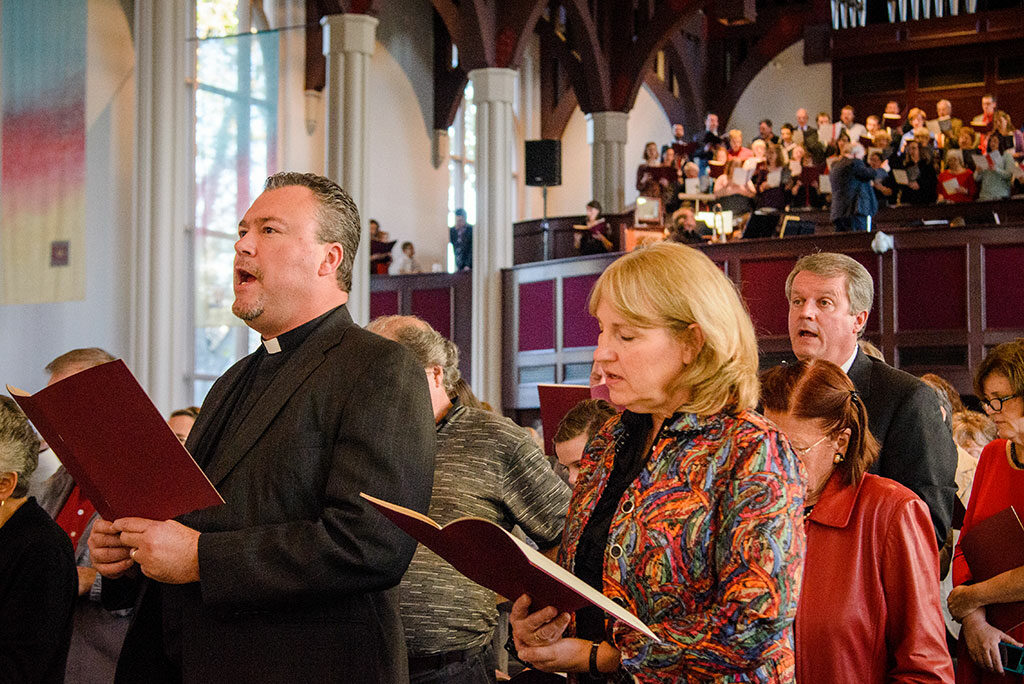
By Kevin Armbrust
ST. LOUIS — The Rev. Randall Golter, special assistant to the LCMS president, opened the inaugural event of the Synod’s 500th Reformation-anniversary year celebration Nov. 6 on the campus of Concordia Seminary, St. Louis, observing, “Luther’s importance [for the Reformation] is only because of God’s work through him.”
The event included a lecture about “Martin Luther: The Idea That Changed the World” — the new film being produced for the anniversary, a worship service and fellowship around a light meal.
“This is the first time Lutherans get to tell the story of Luther,” Synod President Rev. Dr. Matthew C. Harrison said of the film, as he introduced the lecture.
Mike Trinklein, the film’s producer, and the Rev. Dr. Erik Herrmann, associate professor of historical theology at Concordia Seminary and consultant for the film, showed clips from the documentary and explained the thoughts, goals and issues faced during the filming of each scene.
Trinklein said that making the film involved both challenges and opportunities. The greatest challenge, he noted, was, “How do you visualize theology?”
He observed that since the Reformation was really a theological movement, the film must communicate the theology of Luther. Another challenge, Trinklein noted, arose because those who are familiar with the story have constructed images in their minds that are important to them when they think about the events of the story. He emphasized that presenting iconic moments and images requires forethought and precision.
Trinklein suggested that this film provides the opportunity to reach viewers who might never encounter Luther otherwise. For historical accuracy, he invited Herrmann to shooting locations in Europe to provide expertise on issues through Herrmann’s extensive knowledge of Luther and his times.
“So much of what Luther did was out of pastoral care,” Herrmann noted as one of the perspectives communicated through the film. “Luther truly cared for the people.”
A festival worship service in the seminary’s Chapel of St. Timothy and St. Titus followed the presentation about the film.
The Rev. Dr. Kent Burreson, dean of the chapel, led the service of Vespers and Harrison preached. Special music was provided by a choir made up of local LCMS congregation members and an ensemble of instrumentalists — under the direction of Dr. Mark Bender, minister of music at St. Paul’s Lutheran Church, Des Peres, Mo. James Marriott, director of musical arts for Concordia Seminary, played the organ, and the wind symphony from Lutheran High School South in Affton, Mo., provided additional accompaniment.
Harrison began his sermon by recounting events following Luther’s death. He noted that on entering St. Mary’s Church in Wittenburg, Germany, and seeing Luther depicted on the altar piece, Duke Alva said to the Holy Roman emperor, “Even in death, this beast rages on.” Harrison then said, “I like that. Indeed.”
The sermon employed a reading of Luther’s consolations, in which Luther encouraged his readers to find comfort and strength in God’s fatherly love and faithfulness. He pointed to Christ as the Rock in whom people find their strength and joy.
After that reading, Harrison encouraged all in attendance to “rage on in Christ” in every area of their lives and admonished the whole Church to rage on because “we have Christ.”
Burreson noted that music, so much a part of Luther’s life and the Lutheran church’s heritage, was a highlight for many in attendance. Burreson observed, “In word and music, we offered, in the words of Wilfred Karsten’s 500th Anniversary hymn, ‘a symphony of grateful praise’ to the Triune God. As in the Reformation, so in the Church’s worship today in music and song we praised the God who has called us out of darkness and brought us home in mercy through Christ Jesus crucified and risen.”
Throughout the event, Concordia Historical Institute displayed a collection of Reformation-related artifacts and documents in the chapel narthex. The Concordia Seminary Library showcased the founding of the Synod and the Rev. Dr. C.F.W. Walther’s personal copy of the 1580 Book of Concord and Luther’s “Bondage of the Will” from 1591. Walther was the first president of the Synod and the seminary.
“We didn’t celebrate just a man [Luther], but our focus was on celebrating Christ and the purity of the Gospel; the fact that we do not and could not do anything to be saved. Martin Luther would have been proud,” noted Esther Dunlop, a member of St. Paul’s, Des Peres, who attended the celebration. “In addition to being spiritually fulfilling, the fellowship aspect of the celebration was also very encouraging.”
“It’s Still All About Jesus” is the theme of the Synod’s yearlong celebration of the 500th anniversary of the Reformation. For more information about that celebration, visit the Synod’s anniversary website.
Dr. Kevin Armbrust (kevin.armbrust@lcms.org) is manager of Editorial Services with LCMS Communications.
Posted November 17, 2016